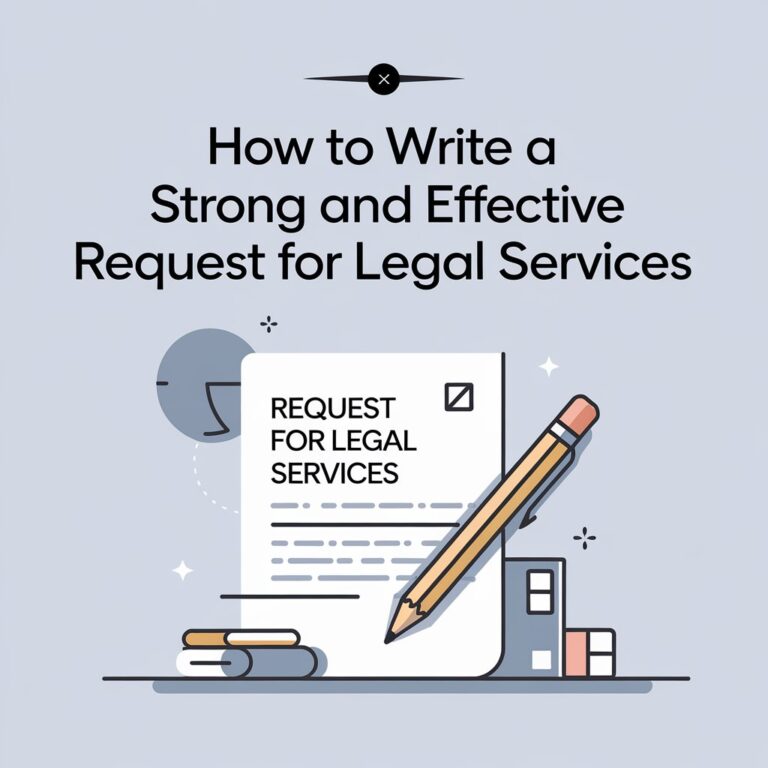When you need legal assistance, writing a strong and effective request is key to getting the help you need. Whether you’re seeking legal advice, representation in court, or help with drafting legal documents, a well-written request will ensure that your message is clear and professional. Below are the essential steps to follow in order to write an effective request for legal services.
1. Start with a Clear and Concise Title
The title or subject of your request should immediately communicate the purpose of your message. It should be short but to the point. For example, “Request for Legal Advice” or “Seeking Legal Representation for [Your Case]” helps set the tone and makes it easy for the recipient to understand what your request is about at a glance. A clear title also ensures that your message doesn’t get overlooked.
2. Introduce Yourself and Provide Context
Begin your request by introducing yourself and providing some background on your situation. State your full name, and if applicable, any important information that will help the lawyer or law firm understand who you are. For example, if you’re reaching out for help with a business dispute, you could mention your company’s name and role. Briefly explain the issue you’re facing. This gives the recipient context and helps them understand why you’re contacting them in the first place.
3. Describe the Type of Legal Help You Need
Be very specific about the kind of legal services you require. The more detailed you are, the easier it will be for the lawyer to understand whether they are the right fit for your needs. If you need legal advice, specify the issue you’re dealing with—whether it’s a contract dispute, family law issue, or personal injury case. If you need legal writing services, be clear about the type of documents or papers you need assistance with, such as contracts, legal briefs, or court submissions. If you need representation in court, explain what kind of representation you’re seeking (e.g., a trial lawyer, mediator, etc.). This will help the lawyer assess whether they can assist you or if they need to refer you to someone else.
4. Provide Relevant Details and Documents
The more information you provide, the better equipped the lawyer will be to understand your case and offer the appropriate advice or services. Include any relevant documents, such as contracts, agreements, letters, or court notices, that pertain to your case. Make sure to explain these documents clearly so the lawyer knows what to look for. If there are any deadlines or time-sensitive matters involved, such as court dates or upcoming negotiations, mention them upfront so that the lawyer can prioritize your request accordingly.
5. Use Professional and Polite Language
While it’s important to be clear and direct, it’s equally essential to maintain professionalism and politeness in your tone. Treat the lawyer or firm as you would any professional service provider—respectfully and courteously. Avoid using demanding language or a tone that could come across as impatient. A polite, well-mannered approach will encourage a more positive response, and the lawyer is more likely to assist you with your matter if they feel respected.
6. Request the Next Steps
Once you’ve provided the details of your request, let the lawyer know how you’d like to proceed. Do you want to schedule a consultation? Are you looking for an initial assessment of your case? Make it clear how you would like the lawyer to respond. Providing this direction helps them understand your expectations and make the process smoother. Additionally, if you need any follow-up, such as a specific time frame for their response, make that clear as well.
7. Provide Your Contact Information
Make it easy for the lawyer to get in touch with you. Include your phone number, email address, and any other relevant contact details. You can also mention your availability, such as the best times for a phone call or meeting, to ensure a timely response. Ensure that your contact information is clear and easy to find in your request so the lawyer can reach out without any delay.
8. Express Gratitude and Close Formally
End your request by expressing gratitude for the lawyer’s time and consideration. A simple “thank you” can go a long way in making your request seem respectful and sincere. Conclude your request formally by signing off with your full name. Using phrases such as “I look forward to hearing from you” or “Thank you for your attention to this matter” shows that you appreciate their time and are eager to move forward with their assistance.
Conclusion
Writing a strong and effective request for legal services involves being clear, concise, and professional. By following these steps, you ensure that the lawyer understands your needs, can assess the situation properly, and knows how to proceed. Remember to include all relevant details, be polite and respectful, and request specific actions from the lawyer. A well-crafted request can set the stage for a productive working relationship with the legal professional you need.
In conclusion, when you write a request for legal services, think of it as a formal communication that helps set the right expectations and provides all the details necessary for the lawyer to assist you.


